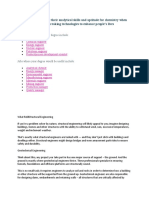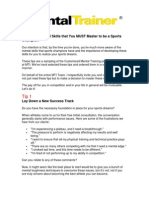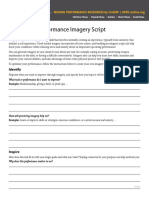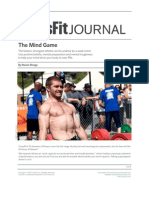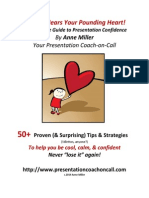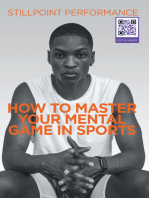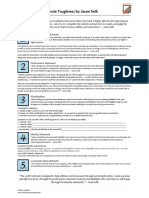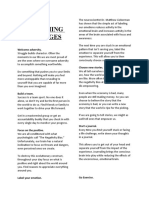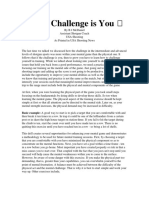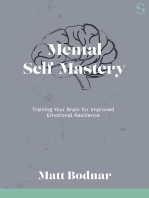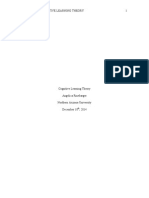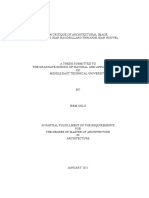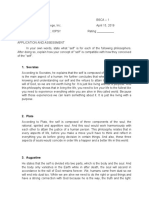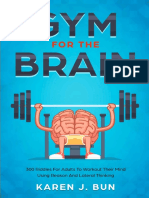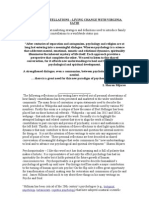Professional Documents
Culture Documents
The Confident Mind
The Confident Mind
Uploaded by
hemsrOriginal Description:
Copyright
Available Formats
Share this document
Did you find this document useful?
Is this content inappropriate?
Report this DocumentCopyright:
Available Formats
The Confident Mind
The Confident Mind
Uploaded by
hemsrCopyright:
Available Formats
Insights from The Confident Mind by Dr.
Nate Zinsser
"Confidence is that feeling that you can do something (or that you know something) so well you don’t have to think about how to do it
when you’re doing it. That skill or knowledge is in you, it’s part of you, and it will come out when needed if you let it." ‐ Dr. Nate Zinsser
You win your “First Victory” before an important test, meeting, or competition when you are confident enough in your ability to stop
telling yourself what to do and trust your training to carry you forward. Acquiring such confidence starts by building up your mental bank
account.
Build Up Your Mental Bank Account
Your mind maintains a “bank account” of memories for the sport, craft, or profession you want to excel
in. Your mental bank account balance grows when you make E.S.P. deposits. E.S.Ps are energizing and
encouraging memories of quality effort, success, or progress.
When your mental bank account is loaded with E.S.Ps, you feel confident and walk around with swagger.
But when your mental bank account balance is low, you experience self‐doubt and panic when a
performance is not going well. Luckily, every day we have an opportunity to make E.S.P. deposits into
your mental bank account and become “rich” with confidence.
A confident tennis player deposits E.S.Ps into her mental bank account by closing her eyes at night and
asking herself: “Where did I put forth quality effort today?” She thinks back to when she dug deep to finish that extra bench‐press rep at
the gym. She ponders on it for a while, trying to feel the same exhilaration she felt and make the moment as colorful as possible to sheer
the memory in her mind. Then she thinks, “What success did I have due to my effort?” and remembers completing the five‐set bench‐press
exercise and revisits the pride she felt in that moment. Finally, she thinks, “What progress did I make as a result of my effort?” She considers
how she increased her strength and how her increased strength will improve her tennis serve.
If two competitors put in similar effort, have identical successes, and make the same progress, but one competitor chooses not to
highlight their effort, success, or progress each day, their mental bank account will feel lower, and their performance will be plagued with
self‐doubt.
Build up your mental bank account by getting into bed each night, reflecting on the time you spent in the field you want to excel in, and
asking:
1. “Where did I put forth quality effort today?”
2. “What success did I have due to my effort?”
3. “What progress did I make as a result of my effort?”
Trigger Total Confidence
As you approach a performance with the sense that your mental bank account is loaded with memories
of quality effort, success, and progress, you are ready to deliver a confident performance. Now, you
need the right pre‐performance routine to trigger "complete confidence" and kill any nervous mental
chatter. Dr. Nate Zinsser teaches his elite performers a simple three‐step pre‐performance routine called
C‐B‐A:
Cue your conviction: Come up with a phrase that helps you to fall in love with your
performance butterflies and convert nervous energy into pure excitement. Answer the
following question: What would you think to yourself in the moments before a competition if
you were eager to show the world how great you were? In the book, a quarterback tells
himself: “Do it like you know it!” A marathon runner tells herself: “Time to cruise!”
Breathe your body: Work your breathing muscles by pushing down and into your belly as you inhale, and then up and in through
your rib cage as you exhale. As you work your breathing muscles, you’ll feel in control of your mental state. And as Belisa
Vranich writes in her book Breathing for Warriors, “Focusing on my breathing means that I can let my body tap into what it
knows and has practiced without my brain interrupting.”
Attach your attention: Pick something inside your performance to be deeply curious about – like the pace and rhythm of the
words coming out of your mouth as you give a presentation, how the guitar strings feel on your fingers as you play, or the
movement of a tennis ball as your opponent tosses it in the air before serving to you. When Tiger Woods played his best golf
between 2000‐2003, he told a documentary filmmaker that he often became so “entrenched” and so “engrossed” on a shot
that all background noise and self‐conscious thought disappeared. He said, “It’s almost as if I get out of the way...and my
subconscious takes over."
After attaching your attention to a target inside your performance, let your subconscious drive your performance and accept all results.
Dwelling on mistakes and berating yourself for poor results depletes your mental bank account and erases the confidence you built up
with quality effort, success, and progress reflection. Therefore, thrive for perfection but quickly accept imperfections because you’re an
imperfect human and beating yourself up is counterproductive.
www.ProductivityGame.com
You might also like
- How To Stop Being A Narcissist: 8 Key StepsDocument18 pagesHow To Stop Being A Narcissist: 8 Key StepsVilayat Ali89% (9)
- Breaking The Chains of Psychological SlaveryDocument83 pagesBreaking The Chains of Psychological SlaveryBobby Murdaz100% (20)
- ALCHEMISTDocument4 pagesALCHEMISTaugustine abellana57% (7)
- EI17 - IndividualActivity1 TELL THE TIPDocument1 pageEI17 - IndividualActivity1 TELL THE TIPKeshawn McBride0% (1)
- Dopamine DetoxDocument4 pagesDopamine DetoxJAWAHAR R100% (2)
- Building SelfconfidenceDocument23 pagesBuilding SelfconfidenceWhisperer Bowen100% (7)
- The Matrix Is Real. Hack It! A Practical Guidebook PDFDocument235 pagesThe Matrix Is Real. Hack It! A Practical Guidebook PDF2dlmediaNoch keine Bewertungen
- MOTIVATIONDocument15 pagesMOTIVATIONShashwat Goyal100% (1)
- Job Interview Questions and Best AnswersDocument11 pagesJob Interview Questions and Best AnswersSumit TyagiNoch keine Bewertungen
- Recruiter Interview Questions and Answers 2245Document9 pagesRecruiter Interview Questions and Answers 2245Kübra YetişNoch keine Bewertungen
- Chemical Engineers Use Their Analytical Skills and Aptitude For Chemistry When Working With Ground-Breaking Technologies To Enhance People's LivesDocument15 pagesChemical Engineers Use Their Analytical Skills and Aptitude For Chemistry When Working With Ground-Breaking Technologies To Enhance People's LivesAbelNoch keine Bewertungen
- Mother Child and Father Child RelationshDocument38 pagesMother Child and Father Child RelationshspellshreemNoch keine Bewertungen
- MBA InsightDocument30 pagesMBA Insightezucog100% (2)
- The Ultimate Guide To Escaping The MatrixDocument23 pagesThe Ultimate Guide To Escaping The Matrixperfectaimr100% (1)
- Basic Concepts of Leadership and Management 1Document6 pagesBasic Concepts of Leadership and Management 1LINDAS XEROXNoch keine Bewertungen
- Career Trajectory PaperDocument9 pagesCareer Trajectory Paperapi-323274094Noch keine Bewertungen
- Rules To Live byDocument5 pagesRules To Live byblon majors100% (1)
- Personal Leadership & Management DevelopmentDocument15 pagesPersonal Leadership & Management DevelopmentSõúmëñ Adhikary0% (1)
- 5BESTMENTALDRILLSDocument10 pages5BESTMENTALDRILLShiharisz9Noch keine Bewertungen
- Garret Kramer - Performance Coaching, Breaking The Myths PDFDocument31 pagesGarret Kramer - Performance Coaching, Breaking The Myths PDFWesley BakerNoch keine Bewertungen
- Mental Block WorkbookDocument16 pagesMental Block Workbookwilligis bondhan wicaksono100% (1)
- 7 Mental Training TipsDocument12 pages7 Mental Training TipsrthirupaNoch keine Bewertungen
- HPRC Create Your Performance ImageryScript 508Document4 pagesHPRC Create Your Performance ImageryScript 508Ζωή ΧατζημάρκουNoch keine Bewertungen
- StressarticleDocument3 pagesStressarticleapi-359104237Noch keine Bewertungen
- EQ Powerup: How Emotional Intelligence Can Boost Your Career and LifeFrom EverandEQ Powerup: How Emotional Intelligence Can Boost Your Career and LifeNoch keine Bewertungen
- Shrago - TheMindGameDocument7 pagesShrago - TheMindGametheFranc23Noch keine Bewertungen
- Mastering The Mental Game-Seminar NotesDocument6 pagesMastering The Mental Game-Seminar Notesswodnis100% (3)
- No One Hears Your Pounding Heart! The Ultimate Guide To Presentation ConfidenceDocument28 pagesNo One Hears Your Pounding Heart! The Ultimate Guide To Presentation ConfidenceAnne MillerNoch keine Bewertungen
- Tom Redhead Intro Mental TrainingDocument5 pagesTom Redhead Intro Mental TrainingBruce NeoNoch keine Bewertungen
- Penerapan Psikologi Pada Cabang Olahraga Renang: Dr. Komarudin, M.Pd. Pko Fpok UpiDocument27 pagesPenerapan Psikologi Pada Cabang Olahraga Renang: Dr. Komarudin, M.Pd. Pko Fpok UpiAgus BudimanNoch keine Bewertungen
- The Power of Visualisation - UpdatedDocument6 pagesThe Power of Visualisation - UpdatedAsadullahNoch keine Bewertungen
- Control of Emotions: To Understand How Imagery Can Be Used To Help Control Emotions in SportDocument23 pagesControl of Emotions: To Understand How Imagery Can Be Used To Help Control Emotions in Sportthomas mageeNoch keine Bewertungen
- 10 Minute ToughnessDocument5 pages10 Minute Toughnessnyc_fdny100% (3)
- 10 Minute Toughness PDFDocument1 page10 Minute Toughness PDFrandom guy100% (1)
- 10 Minute Toughness (Latest)Document1 page10 Minute Toughness (Latest)stevenpatrick17Noch keine Bewertungen
- Ways of Overcoming ChallengesDocument4 pagesWays of Overcoming ChallengesAthena DeGuzmanNoch keine Bewertungen
- An Athlete's Guide to Peak Performance Series: Focus Like a ChampionFrom EverandAn Athlete's Guide to Peak Performance Series: Focus Like a ChampionNoch keine Bewertungen
- An Athlete's Guide To Inner Excellence By: Gary Mack With David CasstevensDocument37 pagesAn Athlete's Guide To Inner Excellence By: Gary Mack With David Casstevensapi-135684223Noch keine Bewertungen
- Mental Toughness in Chess: Practical Tips to Strengthen Your Mindset at the BoardFrom EverandMental Toughness in Chess: Practical Tips to Strengthen Your Mindset at the BoardRating: 3.5 out of 5 stars3.5/5 (2)
- Self Talk Self TalkDocument12 pagesSelf Talk Self TalkZetty Hassim100% (1)
- Challenge Is YouDocument3 pagesChallenge Is Youvin DVCNoch keine Bewertungen
- 8.2.building Your Self-ConfidenceDocument16 pages8.2.building Your Self-ConfidenceFabio GenosNoch keine Bewertungen
- Mental Self-Mastery: Training Your Brain for Improved Emotional ResilienceFrom EverandMental Self-Mastery: Training Your Brain for Improved Emotional ResilienceRating: 2 out of 5 stars2/5 (1)
- Breakthrough Confidence New BWDocument17 pagesBreakthrough Confidence New BWJustin CastilloNoch keine Bewertungen
- Comparing Yourself With Others: by Marvin ZaudererDocument3 pagesComparing Yourself With Others: by Marvin ZaudererPaes C. MarceloNoch keine Bewertungen
- TCB Beginner Guide 4Document13 pagesTCB Beginner Guide 4Jonty ToradmalNoch keine Bewertungen
- Selftalk Health For Yourself LitvinDocument2 pagesSelftalk Health For Yourself Litvinapi-534512444Noch keine Bewertungen
- CAGATINRDocument13 pagesCAGATINRLordelene PendonNoch keine Bewertungen
- Total Soccer PsychologyDocument17 pagesTotal Soccer PsychologyGradinaru EugenNoch keine Bewertungen
- How To Talk To Your Subconscious MindDocument6 pagesHow To Talk To Your Subconscious Mindsoniarc09100% (4)
- The Pillar B's: How to Transform from your Biggest Critic to your Best CoachFrom EverandThe Pillar B's: How to Transform from your Biggest Critic to your Best CoachNoch keine Bewertungen
- The ABC's of Thinking and Feeling: Shy No LongerDocument8 pagesThe ABC's of Thinking and Feeling: Shy No LongerIrene De La CruzNoch keine Bewertungen
- IN6 Hold 2 Out 7: 10-Minute Toughness Summary WorksheetDocument6 pagesIN6 Hold 2 Out 7: 10-Minute Toughness Summary WorksheetmrpablosanchezNoch keine Bewertungen
- Six-Word Lessons for Strength-Based Business Success: 100 Lessons to Build Power, Confidence and Fortitude at WorkFrom EverandSix-Word Lessons for Strength-Based Business Success: 100 Lessons to Build Power, Confidence and Fortitude at WorkNoch keine Bewertungen
- Developing Your Inner CoachDocument65 pagesDeveloping Your Inner Coachballsinhand100% (1)
- Mental Toughness BasketballDocument22 pagesMental Toughness BasketballAbílio LopesNoch keine Bewertungen
- The Simple Secrets of Mental Training: How to Build Mental Toughness and Train Your Brain for SuccessFrom EverandThe Simple Secrets of Mental Training: How to Build Mental Toughness and Train Your Brain for SuccessRating: 4.5 out of 5 stars4.5/5 (2)
- Mental Toughness for the Unstoppable AthleteFrom EverandMental Toughness for the Unstoppable AthleteRating: 5 out of 5 stars5/5 (5)
- Everyone Can Do ReikiDocument41 pagesEveryone Can Do ReikiNinoslav Šafarić100% (1)
- Tejgyan FoundationDocument2 pagesTejgyan Foundationpradip2190Noch keine Bewertungen
- Earl Hartman - Essay On Kyudo TrainingDocument27 pagesEarl Hartman - Essay On Kyudo TrainingMeelis JoeNoch keine Bewertungen
- Eradicate Corruption Build A New IndiaDocument7 pagesEradicate Corruption Build A New IndiasibuNoch keine Bewertungen
- Dignity in Mental HealthDocument57 pagesDignity in Mental Healthmayorking11Noch keine Bewertungen
- Cognitive Learning TheoryDocument5 pagesCognitive Learning Theoryapi-285312776Noch keine Bewertungen
- 13 14Document366 pages13 14Greg LewinNoch keine Bewertungen
- Critique of Architectural Image-Baudrillard Through NouvelDocument146 pagesCritique of Architectural Image-Baudrillard Through NouvelinkognitaNoch keine Bewertungen
- The Happiness Hypothesis: Finding Modern Truth in Ancient WisdomDocument17 pagesThe Happiness Hypothesis: Finding Modern Truth in Ancient WisdomSanikaNoch keine Bewertungen
- Understanding The SelfDocument3 pagesUnderstanding The SelfLynireca Rica Valles LoveteNoch keine Bewertungen
- Ashtavakra by GurujiDocument60 pagesAshtavakra by GurujinishmaNoch keine Bewertungen
- Lesson 2 Formation and Transformation of SelfDocument52 pagesLesson 2 Formation and Transformation of SelfCrecia CastilloNoch keine Bewertungen
- Mark Turner - The Literary Mind-Oxford University Press (1996) PDFDocument198 pagesMark Turner - The Literary Mind-Oxford University Press (1996) PDFmaria lidaNoch keine Bewertungen
- Chandrakirti MadhyamakavataraDocument75 pagesChandrakirti Madhyamakavataratantravidya100% (1)
- Psychology Frontiers and Applications Canadian 5th Edition Passer Test BankDocument209 pagesPsychology Frontiers and Applications Canadian 5th Edition Passer Test BankMichaelTraniftmz100% (19)
- AttatthacariyaDocument11 pagesAttatthacariyatan buiNoch keine Bewertungen
- CounsellingDocument6 pagesCounsellingSingareddy Melchior ReddyNoch keine Bewertungen
- 1703964055Document88 pages1703964055Renéeke V100% (1)
- Beyond Good and EvilDocument97 pagesBeyond Good and EvilRobert Hannah100% (1)
- Reaction Paper (Proper)Document2 pagesReaction Paper (Proper)Carl Darwin FermilanNoch keine Bewertungen
- FAMILY CONSTELLATION - Living Change With Virginia SatirDocument6 pagesFAMILY CONSTELLATION - Living Change With Virginia SatirKay Needham100% (1)
- Healthy Referral Newspaper Winter Games 2010 World EditionDocument24 pagesHealthy Referral Newspaper Winter Games 2010 World EditionThomasNoch keine Bewertungen
- Train Your BrainDocument242 pagesTrain Your Brainiaintellin100% (11)
- Vivekananda Power Capsules For Students, - Swami TadanandaDocument163 pagesVivekananda Power Capsules For Students, - Swami Tadanandauniverse2017Noch keine Bewertungen
- The Matrix Deciphered Part 6Document34 pagesThe Matrix Deciphered Part 6masonic204Noch keine Bewertungen
- TomfooleryDocument26 pagesTomfooleryJim Jim JimNoch keine Bewertungen
- Practical Research 1 Week 1: Test YourselfDocument3 pagesPractical Research 1 Week 1: Test YourselfAra monteroNoch keine Bewertungen
- The Story of The Mind by Baldwin, James MarkDocument112 pagesThe Story of The Mind by Baldwin, James MarkGutenberg.orgNoch keine Bewertungen










